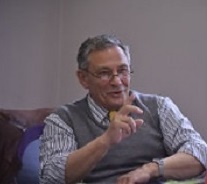Editor's note
International Internet Magazine. Baltic States news & analytics
Friday, 26.04.2024, 08:58
2017- The Year of a New Future
 Print version
Print version |
|---|
Modern changes are so profound, wrote Klaus Schwab in his
famous (“The Forth Industrial Revolution”, 2016) that they are “reshaping the
economic, social, cultural and human context” of our lives. One most visible
“peril” was the fact that modern decision-making is too often caught in
traditional linear-thinking and too absorbed in short-sighted concerns “without
thinking strategically about the forces of disruption and innovation shaping
our future” (p.2-3).
See: http://www.baltic-course.com/eng/editors_note/?doc=16003&ins_print;
Key word – disruption
Here comes the key word –disruption, which shows that
mankind has entered the year 2016, the year of “the fourth industrial
revolution” changing the basic aspects of socio-economic development.
The term was
defined and the phenomenon analyzed by Bower, J. L. & Christensen, C. M. in
their famous article “Disruptive Technologies: Catching the Wave”, in Harvard Business Review,
January-February 1995.
In fact, the
concept of “disruptive technology” continues a long tradition of identifying
radical technical change in the study of innovation by economists, and the
development of tools for its management at a policy level by politicians.
Just one
example: the free, online encyclopedia Wikipedia was
a disruptive innovation that had a major impact on both the traditional,
for-profit printed paper encyclopedia market (e.g., Encyclopedia Britannica) and the for-profit
digital encyclopedia market (e.g., Encarta). The
English Wikipedia provides over 5 million articles for free; in contrast, a
$1,000 set of Britannica volumes had 120,000 articles.
Other “disruptive examples” see in: https://en.wikipedia.org/wiki/Disruptive_innovation
In 1992, Y.F.
Fukuyama in his famous book (The End of History and the Last Man, 1992)
argued that the worldwide spread of liberal democracies and free
market capitalism could signal the end of the final form of human
governance.
However, already
five years later, in his subsequent book (“Trust: Social Virtues and
Creation of Prosperity”, 1995) he modified his position to acknowledge
that culture still develops and economics can evolve into new –previously
unexpected- directions.
Quite noticeable,
that he earned his PhD in political science at Harvard for his thesis on Soviet
threats to intervene in the Middle East; after that he joined the global policy
think tank RAND Corporation.
Reference: https://en.wikipedia.org/wiki/Francis_Fukuyama
Disruption’s effect on humanity
The effects of disruption have been already visible
and numerous for several years: e.g. in politics – through mass media and new
information modes; in climate & environment – through new ways of
production and trade; in urbanisation – through constantly growing and
expanding cities; in public institutions – through apparent dysfunction, and so
on and so forth.
But only at present the cumulative effect, so called
disruptive synergy has emerged…
It seems the world we used to know and live in is slowly
disappearing; however, it is quite difficult to imagine what would come
instead… Some say, technology would “save the day”, i.e. automotive systems
would change globalization processes (for example, searching for cheap labor
force in Asian markets would not be so attractive) with massive “robotics &
services” in modern management to help national-based production.
Circular economy and sustainability concepts as new
production tools would allow fewer resources to use coped with more efficient
and productive methods.
All these and numerous other examples are “behind” the new
modernised concept of disruption, which is going to change our living patterns;
and these changes are very quick to come!
Would happiness & survival follow?
In previous development stages societies have been
accustomed to rapid changes: work force has been advanced and production
methods adequately modernized. Nordic economic model has been quite good at
coping with these challenges: for example, prominent flexicurity concept helped
a lot. The ultimate result has been that Nordic societies have helped to
overcome the previous crisis and citizens have become the happiest people in
the world!
These “happiness” has been accompanied by increase
productivity, growing competitiveness, establishing creative and innovative
companies. Besides, public security system provided a necessary cushion for
quicker changing jobs and re-training.
Along that, green technologies and environmentally safe
production methods paved the way to even more competitive future.
Happiness would follow only if governments can make strong
and competent efforts in figuring out what kind of work force and
qualifications are needed to make a safeguard against new disruptions. Is it
not the government’s obligation to provide citizens with employment, after all?
Of course, it’s not an easy task for governments to tackle
with disruption; but on the hand, it is any government’s “human obligation” too
to make a qualified choice in education and training.
Therefore follows a vital question of survival: can a single
person and the mankind survive the menacing disruption? The answer is clear:
only “adaptive” societies and human beings can! Thus, societies with strong
internal bonds, united by a common “survival idea” can withstand the immanent
disruptive threats. At the same time, societies have to understand the
necessity of perceptively needed quality education, while eliminating threats
to nature and sustaining healthy environment with sustainable goals to reach.
Only in this way we all together can face a “new future”.
So, dear readers, be ready for a changes on the future, which knocks at the
door in 2017. And Happy New Year!











